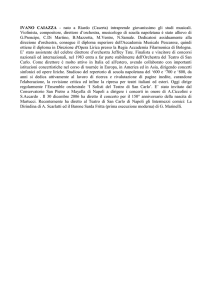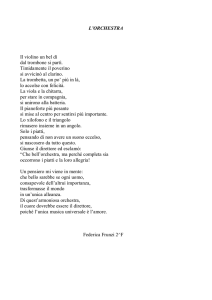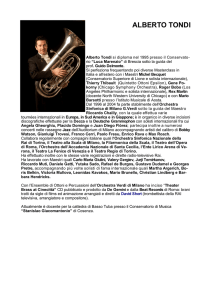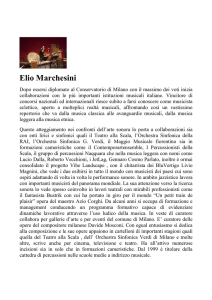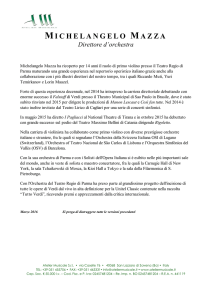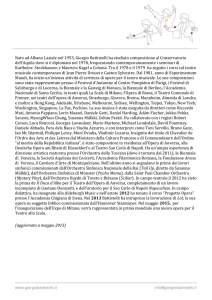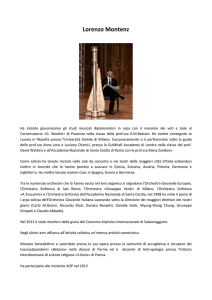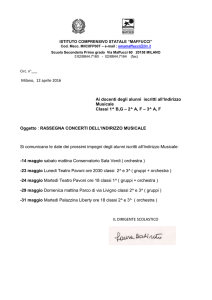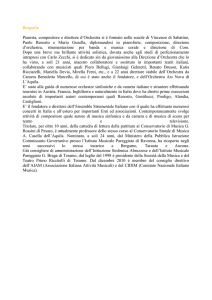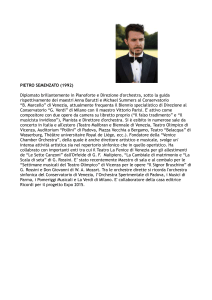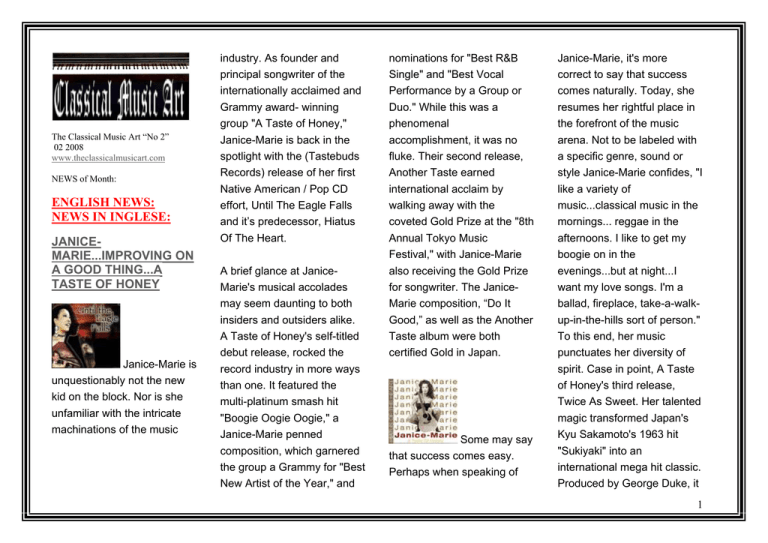
The Classical Music Art “No 2”
02 2008
www.theclassicalmusicart.com
NEWS of Month:
ENGLISH NEWS:
NEWS IN INGLESE:
JANICEMARIE...IMPROVING ON
A GOOD THING...A
TASTE OF HONEY
Janice-Marie is
unquestionably not the new
kid on the block. Nor is she
unfamiliar with the intricate
machinations of the music
industry. As founder and
principal songwriter of the
internationally acclaimed and
Grammy award- winning
group "A Taste of Honey,"
Janice-Marie is back in the
spotlight with the (Tastebuds
Records) release of her first
Native American / Pop CD
effort, Until The Eagle Falls
and it’s predecessor, Hiatus
Of The Heart.
A brief glance at JaniceMarie's musical accolades
may seem daunting to both
insiders and outsiders alike.
A Taste of Honey's self-titled
debut release, rocked the
record industry in more ways
than one. It featured the
multi-platinum smash hit
"Boogie Oogie Oogie," a
Janice-Marie penned
composition, which garnered
the group a Grammy for "Best
New Artist of the Year," and
nominations for "Best R&B
Single" and "Best Vocal
Performance by a Group or
Duo." While this was a
phenomenal
accomplishment, it was no
fluke. Their second release,
Another Taste earned
international acclaim by
walking away with the
coveted Gold Prize at the "8th
Annual Tokyo Music
Festival," with Janice-Marie
also receiving the Gold Prize
for songwriter. The JaniceMarie composition, “Do It
Good,” as well as the Another
Taste album were both
certified Gold in Japan.
Some may say
that success comes easy.
Perhaps when speaking of
Janice-Marie, it's more
correct to say that success
comes naturally. Today, she
resumes her rightful place in
the forefront of the music
arena. Not to be labeled with
a specific genre, sound or
style Janice-Marie confides, "I
like a variety of
music...classical music in the
mornings... reggae in the
afternoons. I like to get my
boogie on in the
evenings...but at night...I
want my love songs. I'm a
ballad, fireplace, take-a-walkup-in-the-hills sort of person."
To this end, her music
punctuates her diversity of
spirit. Case in point, A Taste
of Honey's third release,
Twice As Sweet. Her talented
magic transformed Japan's
Kyu Sakamoto's 1963 hit
"Sukiyaki" into an
international mega hit classic.
Produced by George Duke, it
1
was certified Gold in both the
United States and Japan,
along with “Rescue Me,”
another single from the same
album.
Through the years, JaniceMarie's songs have been
covered, sampled and
borrowed many times. Her
music of yesterday
contributes greatly to the
success of numerous 'R&B,'
‘Pop,' 'Rap' and 'Hip Hop' hits
of today. Janice-Marie's song
Boogie Oogie Oogie has
been recorded by Fablolous,
Brooke Valentine and Yo Yo
and is the first single from the
2005 Roll Bounce movie. A
second version of the same
song has been recorded by
Keyshia Cole and Fablolous
and is also featured in the
Roll Bounce movie. Her
music has been featured by a
host of other artists as well,
including Ice Cube, Mary J.
Blige, MC Lyte, Positive K,
Pure Sugar and European
artists Martin Carboo, Peter
Andre and a multitude of
other Japanese and
European artist. Her music
has also been showcased on
television programs including
“American Idol,” “King Of
Queens,” "All My Children,"
"Fairy Odd Parents," “Monday
Night Mayhem,” ”The
Parkers.” “Rock and Roll
Jeopardy,” “The Oprah
Winfrey Show," “The Martin
Short Show," “Touched By An
Angel," just to name a few.
Movie credits include the
2005 films “Roll Bounce” and
“Into The Blue”, as well as
“Screwed," “Cowboys &
Angels," “A Fate Worse Than
Death," "Step Mom," "Mystery
Man," "Contact" and "54,"
and many more. Commercial
credits include Coca Cola,
Frito Lay, The New York
Lottery, Burger King and Old
Navy. Janice-Marie’s music is
also featured in variety of
video games and slot
machines including the Dick
Clark’s American Bandstand
slot machine.
After such a
extended period working
behind the scenes, JaniceMarie the record producer,
musician, songwriter and
entertainer has once again
returned to the limelight with
the release of her longawaited CD Hiatus Of The
Heart and Until The Eagle
Falls.
Janice-Marie has decided to
take her place center stage
and she does so with a style
and grace that is all her own.
She has been performing to
sold-out concerts from the
east coast to the west coast,
in casino, arenas, clubs,
festivals and concert halls.
Janice-Marie’s shows are not
only exciting and uplifting,
with her natural gift of wooing
her audience, she commands
your undivided attention and
leaves you wanting more.
Her new CD contains songs
of love and life. Alice O'Neil of
Hollywood-Behind-the
Scenes writes in her review
of the "Hiatus of the Heart"
CD... “she seduces listeners
with her vocal art and guitar
expertise. She gives a new
meaning to the age-old
longing to be free, in all its
manifestations. “Until The
Eagle Falls”, was written as a
gesture of gratitude to all of
2
the people who took part in
that magical weekend in
Gallup, New Mexico. That’s
where, through the
embracing of her people’s
songs and dance, the spirit of
this ancient ancestry
impacted her heart, mind and
soul. In celebration of her
Stockbridge-MunseeMohican heritage, JaniceMarie weaves legendary
Native American mythology
about how the eagle NEVER
falls (and a haunting melody)
into a tranquil and precious
ballad of
devotion…eternal…a love
song for the ages.
“Until The Eagle Falls” CD
and Music video garnered
Janice-Marie with the ‘Award
of Excellence’ and the ‘Award
of Distinction’ at the 2003 1st
Indian Summer Festival Film
and Video Image Awards, as
well as the 2002 “Nammy
Award for ‘Best Producer,’
not to mention the Silver
Arrow Award for her
contributions to Native
American Music. In addition
to all of the above, JaniceMarie is currently featured on
the Felton Pilate (of Con
Funk-Shun)
www.feltonpilate.com,
"Nothing But Love Spoken
Here" CD, where she sings a
duet with Felton on the song
"Only For You". She is also
the featured love interest in
Felton's music video of his
first single, "Nothing But Love
Spoken Here" on the Escapi
label. You can also catch
Janice-Marie as she co-host
along with Felton Pilate on
the "Love Spoken Here" radio
show.
www: www.janice-marie.com
:::::::::::::::::::::::::::::::::::::::::::::::::::::::::
Presentation of Sahra
From a small
country town north of Sydney,
Australia, Sahra was
introduced to the world of
entertainment at an early
age. Even as a child, Sahra
was convinced that
performing would be her life.
Since then she has journeyed
far .
Singing alongside Australian
acts such as Vanessa
Amorossi and Richard
Clapton and touring with
bands throughout Australia
and performing both as a
singer and actress on
television, Sahra now brings
to you, her debut album,
GIRL PARTS .
Sahra and Blue
Pie Director, Damien Reilly,
first met over 8 years ago in
1996 and they have remained
friends ever since. The duo
began writing in 1997 and put
together their first song " One
Sweet Day " with Producer,
Phil Munro. Since that time,
Sahra , Damien and Phil set
out to write a solid body of
3
songs that would be timeless
and that would be true to
Sahra's vocal ability.
The first single to be released
is a remake of the 1978 R&B
number one hit ' Boogie
Oogie Oogie " by " A Taste of
Honey ". The songs on GIRL
PARTS began with Damien
playing his guitar and Sahra
adding the melody and lyrics.
It has since grown into a
writing trio combining the
talents of Phil as Producer,
arranger and songwriter.
Sahra's angelic voice,
coupled with her ability to
take you away to the true
essence of the songs that
she sings makes this album
very unique. She has that
special magic that stars
possess and she truly shines
on her own.
GIRL PARTS is
an intensely personal and
emotive album with a number
of songs being recorded in
just one take. You can feel
and hear her joy, her
laughter, her sorrow and her
tears in the lyrics. GIRL
PARTS is all the parts of a
girl called Sahra .
Sahra's star has only just
begun to shine .please visit
the shop to get all your digital
content from Sahra.
www: www.sahra.com.au
:::::::::::::::::::::::::::::::::::::::::::::::
Presentation of String
Quartet Tajj
The "TAJJ"
string quartet was formed in
1997. in Novi Sad by
musicians who came to know
each other during study at "
Academy of Arts " in Novi
Sad . They attracted attention
with their string quartet
playing of professor István
Varga famous violoncellist of
Novi Sad and ex - Yugoslavia
. He was their artistic director
until 1999.
From 1999. "TAJJ" string
quartet worked without any
professional guidance, but
they successfully took part in
many international master
classes with famous chamber
musicians: "Amadeus"
quartet, "A.Berg" quartet,
"Bartok" quartet, "Chilingirian"
quartet, "Daniel" quartet,
"Smetana" quartet, "Medici"
quartet, "Janacek" quartet,
A.Steinhard, S.Devich and A.
Flammer.
They performed on many
concerts and chamber
festivals in S&MN and
abroad. The most important
performances were in
NOMUS (music festival in
Novi Sad ), and at
international competition for
string quartets "Premio Paolo
Borciani"- Italy 2000.
4
From 2003. They started to
perform with other chamber
musicians from S&MN,
enriching their repertoire:
Aleksandar Tasić - clarinet,
Ratimir Martinović - piano,
Nađa Bulatović - piano
(Köln), Branislav Jatić - bass
(singer), Vera Kovač Vitkay sopran, Laura Levai Aksin flute, Sonja Antunić - flute,
Iris Kobal - piano, Ivica
Marušević - doublebass,
Nenad Vasić - horn, Žarko
Perišić - bassoon.
The most important project in
their carrier was the II
"Memorial Isidor Bajić" international piano
competition, where they
performed as residence
quartet for chamber - final
round (piano - quintets).
From 2003. They are a
students of postgraduate
studies of "Faculty of music
arts" Belgrade , for subject:
chamber music -string quartet
in the class of professor
Ladislav Mezei. Discography:
the repertoire of the "TAJJ"
string quartet ranges from
J.Haydn to the highpoints of
twentieth century chamber
music ; various
interpretations has already
been recorded on compact
disk: Promo cd with J.Haydn
and A.Dvorak, Clarinetquintets W.A.Mozart and
J.Brahms with Aleksandar
Tasić, first Vojvodinian cd of
vocal - chamber music with
Branislav Jatić, and two
promo cd's with modern
Vojvodinian hungarian
composers of XX. Century.
www: www.idyllium.it
:::::::::::::::::::::::::::::::::::::::::::::::
Presentation of Vladimir
Zubitski
Since 1976 he has
contertized throughout the
world as artist of the
Ukrainian Concert
Organisation.
Vladimir Zubitski
(1953) was born in
Goloskogo, Nikolaev.
He received his first bayan
lessons at the age of 6 in the
Krivoy Rog Childrens Musical
School and then he studied at
the Gnessin Musical College
under Vladimir Motov. From
1971 to 1979 he attended at
the Kiev Conservatory of
Music in the classes of
Vladimir Besfamilnov
(Accordion), V. Gnedash
(Orchestra Conducting) and
M. Skorik (Composition). In
1975 (Helsinki) he won the
Accordion "Throphèè
Mondial”.
Vladimir Zubitsky is a wellknown composer: he was
awarded the UNESCO Prize
in 1985 for the "Sette
Lacrime" Requiem . Currently
living and teaching in Italy,
Vladimir has recorded more
CDs e LPs. He gives many
workshops, seminars and
lectures. Often invited as a
jury member to the most
important accordion
competitions, he is the
President of the Ukrainian
Accordion Association.
5
Today, some of Your more
prestigious works as:
Homage to Astor PIAZZOLLA
and ROSSINIANA 1°, 2° and
3° movement, have been
produced by Sabino
Mogavero and published by
the Idyllium Music Publishing
in Milan in the Cd from the
title Concert of the Russian
Juvenile Orchestra Vol.2 .
www: www.idyllium.it
:::::::::::::::::::::::::::::::::::::::::::::::
Presentation of Deborah
Kooperman
Was born
and raised on her parents
chicken farm in New York
State. It was during these
formative years that her love
for music began. Her parents
often took her to local
concerts of Woody Guthrie,
Cisco Houston and Pete
Seeger,and she grew up
listening to records of blues,
jazz and folk music. In the
60's Deborah moved to the
hub of "where the music was"
- to Greenwich Village in New
York City.
The coffee houses were her
training ground, and to
supplement her student life
she sang and played guitar
as a solo artist along with
other "unknown" artists such
as José Feliciano, Bob Dylan,
Richie Havens and John
Sebastian. In 1968 she
moved to Italy and enrolled in
the Conservatory of Bologna
to study piano. Firmly
established in the Bologna
music scene she then
founded a club- "Ostaria delle
Dame" along with other
Italian musicians such as
Francesco Guccini and Lucio
Dalla.
In the 70's
Deborah was one of the few
fingerstyle guitarists in Italy
and collaborated on many
recordings of Italian artists.
Her repertoire ranges from
traditional folk-blues to
ballads and features, of
course, her own songs. Her
interpretations of songs of
other musicians and poets
such as Leonard Cohen,
Buffy Sainte-Marie, Bob
Dylan and Pete Seeeger are
unique. When not doing
concerts she runs a musical
instrument store near Verona,
Italy and directs a rock-pop
choir- "Coro Woodstock" and
a music school.
Today, thanks to Uberto
Pieroni (who introduced
Deborah to Sabino
Mogavero, a record
producer), she has recorded
a entitled "Yesterday
Tomorrow" pubblished by
Idyllium Music Publishing of
Milan, Some of the songs
wonderfully interpreted by D.
Kooperman are: Bob Dylan's:
“TOMORROW IS A LONG
TIME” and several
traditionals songs such as:
900 MILES, PRETTY POLLY,
DRINK'S BLUES and…
www: www.idyllium.it
:::::::::::::::::::::::::::::::::::::::::::::::
6
Presentation of Zule Zoo
The ZuleZoo are a group of
multitalented Nigerians who
has popularized a genre of
Music which projects Nigerian
culture through creativity in
lyrical composition and
innovative use of African
percussion instrument. The
genre of their music is known
as the Takuraku beat. The
word Zulezoo means,
Forgotten Warriors Never
Die. Zulezoo is currently the
top musical artistes with a
unique, energetic, African
cultural dance which thrills a
lot of people wherever they
perform, both at home and
abroad. Their first hit solo
tract is titled: Kerewa, of
which they are popularly
known for. The music was
banned by the censors board
due to a misunderstanding of
the song as advocating
adultery. This created a
rubble in the music industry in
Nigeria and almost caused a
set back to the Zule-Zoo. Not
long after, the group came
out with a full album entitle:
BANNED IN NIGERIA, a 9track album including the
banned Kerewa, which made
wave nationwide and is now
a huge success. Kerewa was
subsequently unbanned in
Nigeria and the group is flying
high in the sky. They are
most sought in Shows,
Concert and media houses.
Their emotions and the drive
to experience life, to its fullest
potentially by pushing the
limits of the mind and body.
This "all or nothing" attitude is
profoundly expressed in the
album? title track, a flagship
anthem against the social
puppeteering of society and
the efforts to sever the strings
from the controlling hand in
this "show called life". Like
Awilo, they stormed the
music scene with a firebrand
style that is penetrating every
nook and cranny of the
nation. Zule-Zoo boys are
emerging Nigerian musicians
whose music pattern cum
costumes on stage speak
volumes of African culture,
reports BENJAMIN NJOKU.
They are like birds of the
same feathers that have
decided to flock together.
From childhood, despite their
different parental
backgrounds, they appear to
have been joined eternally by
destiny to take the world
someday by storm. And really
they have. Ibrahim Alhassan
and Mike are the emerging
Nigerian musicians from the
Middle-belt who are no less
the symbol of what African
music should portray. Since
their debut last year with their
hit track album,"Kerewa", the
better known Zule-Zoo boys
are waxing stronger to
influence the music tradition
in this part of the world. With
their "Takoroko beat " as they
call it, the dancers turned
musicians like the
groundbreaking Awilo trend is
sweeping across the nation
with their heroic
7
demonstrations and portrayal
of the black culture on stage.
Watching
them on stage is like going to
the theatre to behold a
performance. With a blend of
western hip-hop and African
flavour, the rising artistes thrill
their fans to a kill. The young,
the aged and the lad are
unconsciously rising up to
their kind of music. From the
north to the west and east,
inside the bus, on the road
and at home, Zule-Zoo boys
are the latest talk of the town.
Their Kerewa music evades
the airwave all the time as it
has equally formed the
subject of discourse in the
Nigerian music scene. Even
with the attempt last year by
the censor’s board to ban
their music on the basis of its
alleged generation of bad
influence on the younger
ones, the singers’ kind of
music has continued to gain
acceptance and recognition
within and outside the
country. While relishing in
promoting African culture
through their music cum
dance steps, the two of a kind
singers have come a long
way as friends to register
their impact on the music
scene.
"Zule -Zoo is a combination of
Ibro and Mike, we did not just
jump into music. We started
as professional dancers right
from Benue State as far back
as 1992 before we came
down to Lagos in 1996 to
attend the National Troupe
audition. After the audition,
we decided to stay back and
go into music." Ibrahim
Alhassan, the leader of the
group narrated during a
recent encounter with Sunday
Arts at their film village base
near the National Theatre
Complex, Iganmu. The two
artistes who hail from
different homes for ages have
been united by fate to engage
in what they are doing today.
"We are not twins but we
have been very close to each
other from our childhood days
at school." Ibrahim says both
him and his partner, Mike
knew, based on their
childhood mingling, that they
both had a lot to share with
each other. During their
childhood days, he
recounts,"we discovered that
we have something in
common and then, could
work together to shake the
world". He recalled that he
came to Lagos before Mike
who later joined him as they
both featured in the National;
Troupe’s audition which
rather left them disappointed.
"After the NTN’s audition, I
had no fare to go back to
Benue State, so I decided to
stay back and sweat it out
with life. There and then, I
started working hard to
ensure that I realize my
ambition to become a star in
my lifetime. About that time,
Mike who left immediately for
Benue after the audition later
returned to join me and that
was when we started
researching on how to
actualize our dream as we
later came up with the name,
Zule-Zoo, meaning forgotten
warriors never die.
Notwithstanding what
difficulties they faced as a
result of their struggle to
actualize their dreams to take
the world by storm, the ZuleZoo boys are today emerging
8
stronger, outshining their
contemporaries. Their blend
of African rhythm with the
western hip-pop is something
of innovation that has given
African music a new idiom.
Like the Afro-beat music, the
Zule-Zoo boys are treading
the path of late Fela who
originated the Afro-beat as a
music idiom.
With their Takoroko beat, the
boys create a style that is
less imitative. According to
them, the thrust of their music
is to promote African culture
and also use the same to
preach peace, equal rights
and justice across the
globe."We want to use our
kind of music to promote our
culture. We always bear the
symbol of African culture
because Africa is endowed
with rich culture. In future, it is
our dream to showcase
young but talented musicians
who lack the desired
assistance to hit the mark
and be celebrated". says the
band leader.
www: www.idyllium.it and
www.bluepie.com.au
:::::::::::::::::::::::::::::::::::::::::::::::
ITALIAN NEWS:
NEWS IN ITALIANO:
ROMA TRE
ORCHESTRA – Storia
L’idea di
formare un’orchestra
dell’Università degli Studi
Roma Tre risale all’autunno
del 2001. Da un lato Valerio
Vicari, allora studente della
Facoltà di lettere e filosofia e
del Conservatorio S. Cecilia,
e dall’altro Roberto Pujia,
docente della stessa facoltà e
vecchio membro del CdA
dell’Ateneo pensavano,
ciascuno per proprio conto, al
modo di promuovere la
cultura musicale e soprattutto
alla possibilità di avere
un'orchestra giovanile
universitaria. Un giorno i due
si sono incontrati e
sommando i rispettivi
entusiasmi hanno deciso di
tentare la realizzazione
dell’idea.
Le idee hanno come è noto
bisogno di gambe e le prime
gambe dell’orchestra sono
state il modesto fondo per il
finanziamento delle iniziative
culturali e sociali promosse
dagli studenti per l’a.a. 20002001. La strada appare
subito lunga e difficile,
costellata di ostacoli
finanziari, organizzativi,
tecnici. Senza ancora un
nome ed una fisionomia
organizzativa e giuridica ben
definita, l’Orchestra Roma
Tre arriva, il 28 giugno 2002,
alla prima apparizione
pubblica, nell’Aula Magna
della facoltà di Lettere. La
sfida da quel momento in poi
diventa il riconoscimento e
l’istituzione stabile. Si giunge
così il 19 dicembre 2003 a un
nuovo appuntamento: ancora
un concerto nell’Aula Magna
della facoltà di Lettere.
L’orchestra ha finalmente un
logo e un nome ("Roma Tre
Orchestra").
9
giuridica.
La Roma Tre Orchestra.
La vera
svolta avviene ad aprile
quando il Rettore invita la
neonata orchestra a tenere
un concerto in occasione
della chiusura dell’anno
accademico 2003-2004 al
Teatro Palladium il 16 giugno
2004.
L’orchestra si guadagna così
sul campo il riconoscimento,
sia pure ancora ufficioso,
dell’università. Più tardi una
formale delibera del Cda
riconoscerà l’associazione e
ne assumerà il patrocinio.
Oggi quindi abbiamo
un’associazione autonoma,
riconosciuta dall’università
con propria personalità
www: www.r3o.org and
www.idyllium.it
:::::::::::::::::::::::::::::::::::::::::::::::
Biografia di Giampaolo
Maria Bisanti
Milanese,
nato nel 1972, Giampaolo
Maria Bisanti intraprende
giovanissimo gli studi presso
il Conservatorio di Musica G.
Verdi di Milano in clarinetto,
pianoforte, composizione e
successivamente in direzione
d’orchestra diplomandosi nel
1997 con il massimo dei voti.
Parallelamente frequenta il
Corso Triennale di Alto
Perfezionamento in direzione
d’orchestra presso
l’Accademia Musicale
Pescarese diplomandosi nel
1995 sempre con il massimo
dei voti. E’ vincitore dello
stage per direttori d’orchestra
tenuto dal M° Donato
Renzetti presso i Pomeriggi
Musicali di Milano nel
1998.Nel 1998 e 2001 è
docente presso il
Conservatorio “G.Verdi” di
Milano in Esercitazioni
Orchestrali e Direzione
d’Orchestra. Dal 1995 è
direttore principale
dell’Orchestra Mozart di
Milano e viene regolarmente
ospitato presso le più
prestigiose orchestre e
festivals internazionali: Le
Serate Musicali, I Pomeriggi
Musicali di Milano,l’Orchestra
Sinfonica di Milano Giuseppe
Verdi, l’Orchestra Sinfonica di
Sanremo, l’Orchestra Milano
Classica, l’Orchestra “Mario
Gusella” di Pescara,
l’Orchestra Stabile di Como,
l’Orchestra Sinfonica Città di
Ferrara, il Cantiere
Internazionale d’Arte di
Montelpulciano, l’Orchestra
del Teatro Lirico di Spoleto,
l’Orchestra Filarmonia
Veneta, l’Orchestra da
Camera della Lombardia
“G.Cantelli” di Milano,
l’Orchestra of Colours di
Atene, la Festival Orchestra
di Sofia, l’Orchestra
Internazionale di Sarajevo,
Concerto Boswil, la Kyoto
Festival Symphony
Orchestra, la Danubia
Symphony Orchestra,
l’Orchestra Regionale
Toscana, la Matav Orchestra,
l’Orchestra della RadioTV di
Budapest,l’Orchestra della
Radio Tv e dell’Opera di
Tirana, la Miskolc
Orchestra,l’Orchestra
Sinfonica Città di Grosseto, la
10
Orquesta Sinfònica Juvenil
del Ecuador,l’Orchestra
Internazionale Karmelos e la
Basel Sinfonieorchester
Nel 1997 dirige “La Lettera
Anonima” di Donizetti al
Teatro Litta di Milano con
l’Orchestra Sinfonica
Giovanile del Conservatorio
di Milano, e la regia e
scenografia del Teatro Alla
Scala.Ha diretto in Italia,
Giappone, Francia, Ungheria,
Svizzera, Albania,
Sudamerica e Grecia nei più
prestigiosi teatri e sale da
concerto tra cui l’Auditorium
di Milano,il Megaron Concert
Hall di Atene, la Alti Hall di
Kyoto, il Teatro Comunale di
Ferrara, la Ferenc Liszt
Academy Hall e Millenaris
Theatre di Budapest, la
Tonhalle di Zurigo, il Teatro
Ponchielli di Cremona, il
Teatro Fraschini di Pavia, il
Teatro Sociale di Como, il
Teatro Donizetti di Bergamo,
il Teatro Grande di Brescia, i
Teatri Nuovo e Caio Melisso
di Spoleto, il Teatro Verdi di
Padova, il Palais de l’Europe
di Menton, la Musikhalle ed il
St.Jakobs Park di Basilea, il
Teatro Nacional Sucre di
Quito, la Sala Grande del
Conservatorio di Milano, il
Teatro Morlacchi di Perugia, il
Lyrick Theatre di Assisi,il
Teatro degli Industri di
Grosseto, il Teatro dei
Rinnovati ed il Teatro dei
Rozzi di Siena, il Teatro
Cavour a Imperia, il Teatro
della Triennale ed il Litta di
Milano, il Teatro Comunale e
Eden di Treviso,il Teatro
Coccia di Novara, la
Palazzina Liberty di Milano, il
Teatro Manzoni di Monza,il
Teatro Gobetti di Torino,il
Teatro Toniolo di Mestre ed il
Teatro Sociale di Rovigo.
Ha
debuttato 21 titoli di opere
liriche e diretto più di 350
concerti sinfonici (tra cui
anche molte partiture
d’avanguardia), collaborando
con artisti di chiara fama tra
cui K.Ricciarelli, M.Pertusi,
T.Fabbricini, R.Canzian,
I.Salazar, D.Abbado,
P.Villegar, U.Santicchi,
I.Stefanutti, S.Vizioli, S.Krilov,
F.Meloni, S.Milenkovic,
A.Pay, R.Vernizzi,
V.Kholodenko, Bacchetti,
R.Bieri, A.Meunier, F.Sartori,
U.Clerici.Nel 1999\2000
dirige l’Orchestra Stabile del
Teatro di Como e “I
Pomeriggi Musicali” nei
principali Teatri della
Lombardia (Cenerentola di
Rossini e Bohemè di Puccini
per l’As.Li.Co.) e con il
M°Luciano Berio coadiuva il
progetto europeo “L’Arte della
Fuga 2001” del Teatro Lirico
di Spoleto di cui è assistente
alla direzione artistica e
direttore della stagione lirica
(Oberto Conte di San
Bonifacio) e sinfonica; è
inoltre docente titolare del
Corso di Perfezionamento
per professori d’orchestra
anno 2000; all’Opera Festival
Bassano del Grappa dirige
nel 2001 “Oberto Conte di
San Bonifacio” e “Otello” di
Verdi, e nel 2002 il “Barbiere
di Siviglia” di Rossini con la
Filarmonia Veneta e grande
successo di pubblico e critica.
Vincitore di numerosi premi
internazionali (MitropoulosAtene 1998, Franco
Capuana-Roma 1999 e
Budapest 2002) e nazionali
(Premio d’Onore per meriti
11
artistici Conservatorio di
Milano-1998 e Premio “Tullio
Besa” Regione Veneto-2002),
è iscritto all’Albo d’Oro del
Mondo della Musica di Roma,
nella Banca Dati Musicale
Italiana e Podium del Cidim
(quale italiano vincitore di
concorsi internazionali),
nell’A.I.T. Opera di Ginevra e
nel 2001 British and
International Music Yearbook
di Londra. Discografia 2006:
La Idyllium Music Publishing
di Milano, pubblica il Cd,
prodotto da Sabino
Mogavero, “Stabat Mater” di
G. B. Pergolesi, Direttore
d’Orchestra Giampaolo Maria
Bisanti, soprano Corinna
Catelli Panza, mezzosoprano
Rachel O’Brian. Prossimi
debutti: uglio 2006 Orchestra
e coro Giuseppe Verdi di
Milano-Puccini il Trittico
(integrale) ottobre 2006
Orchestra e coro Giuseppe
Verdi di Milano-Luciano
Chailly-opera l’Aumento in
prima esecuzione mondiale
assoluta-diretta Radio Rai 3
dicembre 2006 Gran Teatro
la Fenice di VeneziaStagione Sinfonica -gennaio
2007 Trento Teatro Sociale,
La Boheme -aprile 2007
Monterey Symphony
Orchestra San Francisco.
www: www.idyllium.it
:::::::::::::::::::::::::::::::::::::::::::::::
Biografia di Stefano
Seghedoni
E' nato a Modena
nel 1970 e si è diplomato in
Composizione e Direzione
d’orchestra presso l’Istituto
Musicale Pareggiato “O.
Vecchi” di Modena e il
Conservatorio “G.B. Martini”
di Bologna sotto la guida dei
Maestri Cristina Landuzzi e
Nicola Evangelisti per la
Composizione e dei Maestri
Giancarlo Andretta, Pietro
Veneri e Paolo Arrivabeni per
la Direzione d’orchestra. Ha
seguito inoltre corsi di
perfezionamento con i
Maestri G. Indulti, R.
Cognazzo, G. Ligeti, G.
Petrassi, A. Solbiati, A.
Guarneri, E. Morricone e F.
Donatoni e, grazie all’incontro
con il Maestro Carlo Felice
Cillario ha approfondito lo
studio del repertorio lirico
italiano.
Già Maestro sostituto presso
diversi teatri ha lavorato con
prestigiosi artisti quali: Mirella
Freni, Nicolai Ghiaurov,
Placido Domingo, Frans
Brueggen, Nicola Martinucci,
Massimo de Bernart, Yasuko
Hayashi, Richard Bonynge,
Leone Magiera, Enzo Cara,
Antonio Salvadori, Franco
Bordoni ecc…
Ha collaborato per anni con
l’Accademia Verdi –
Toscanini come codocente
nei corsi di canto lavorando
con Virginia Zeani, Beatrice
Bianco, Leo Nucci e Enzo
Dara, è attivo inoltre come
accompagnatore, attività che
lo ha portato a effettuare
concerti in sedi prestigiose in
Italia ed in Giappone.
Come compositore ha
ottenuto riconoscimenti in
importanti festivals e concorsi
(Di Nuovo Musica – 1997,
12
Premio Valentino Bucchi). Ha
composto inoltre un’opera da
camera (“La corista” da
Cechov), rappresentata al
Teatro Nazionale di Marsiglia
e al Teatro Comunale di
Modena sotto la sua
direzione, e un musical per
bambini, rappresentato in
prima esecuzione presso lo
Sperimentale di Ancona nel
marzo 2001 e ripresa
successivamente presso altri
teatri marchigiani. Sempre
presso il Teatro Sperimentale
del capoluogo marchigiano,
ha presentato, nel mese di
maggio 2003, il suo nuovo
musical per bambini “Saghir il
piccolo vento”. Nel mese di
settembre del 2005 gli è stato
commissionato un “Gloria”
per il concerto celebrativo dei
60 anni dell’autonomia
valdostana, che è stato da lui
diretto a capo dell’Orchestra
Sinfonica Regionale della
Valle d’Aosta e del coro
regionale “Emile Chanoux”.
Nell’ottobre del 2005 ha
debuttato al Teatro Piccolo
Regio di Torino dirigendo la
prima mondiale della sua
opera in un atto “Alice”
riscuotendo un enorme
successo. Nel 2006 gli è
stato commissionato dal
TAJJ Quartet di Novi Sad
(Serbia) “Five miniatures for
string quarte” e da loro
presentato nella cornice del
Sassuolo Musica Festival.
Come direttore d'orchestra ha
diretto in numerosi teatri e
festival di città italiane ed
estere: Modena, Città di
Castello, Carpi, Ferrara,
Milano, Cagli (PU), Orvieto,
Cremona, Ivrea, Varese
Ligure, Piacenza, Parma,
Sanremo, Fano, Aosta,
Napoli, Firenze, Volterra,
Cascina, Bologna, Bolzano,
Bressanone, Repubblica di
San Marino, Brest
(Bielorussia), Kharkov
(Ukraina), Novi Sad (Serbia),
Marsiglia, Principato di
Monaco. E' stato inoltre
assistente di Michael Nyman
per l'allestimento della sua
opera "Noises, Sounds and
sweet Airs", e di Claudio
Desderi per l'incisione
discografica de "La pietra del
paragone" di G. Rossini.
Particolarmente attivo anche
nel campo della musica
contemporanea, ha
instaurato una proficua
collaborazione con “I
cameristi di S. Marino” che ha
diretto in numerose
esecuzioni di importanti artisti
del nostro secolo e in
numerose prime esecuzioni
di giovani compositori.
NOTE:
Ha inoltre collaborato con
l’Orchestra Sinfonica Italiana
durante il concerto-evento
per i 40 anni di carriera del
M° Luciano Pavarotti tenutosi
presso il Teatro Comunale di
Modena, e con la Fondazione
Toscanini come preparatore
del cast vocale per
l’esecuzione della “Missa
Solemnis” del M° Stelvio
Cipriani, eseguita in prima
mondiale nel settembre 2001
presso l’Auditorium di S.
Patrignano.
Come direttore ha lavorato
con diverse orchestre, tra le
quali: Orchestra Filarmonica
regionale di Brest
(Bielorussia), Orchestra
Sinfonica di Sanremo,
Orchestra “Pro-Arte Marche”
di Fano, Orchestra Sinfonica
di Pesaro, Giovane Orchestra
Sinfonica Italiana, Orchestra
Sinfonica Regionale della
Valle d’Aosta, Orchestra
Spazio Musica, Orchestra
13
Classica di Alessandria,
Orchestra Sinfonica di
Pesaro, Piccola Orchestra
Italiana, Orchestra da
Camera del Teatro Comunale
di Modena, Orchestra
Sinfonica della Vojvodina
(Serbia), Orchestra e coro del
Teatro Nazionale Serbo di
Novi Sad, Orchestra e coro
del Teatro dell’Opera di
Kharkov (Ucraina), Orchestra
Filarmonica di Kharkov
(Ucraina), Orchestra
Sinfonica Giovanile del
Piemonte, I Solisti di Perugia,
I Musici di Parma, Orchestra
Jupiter, Orchestra
Filarmonica di Nizza
(Principato di Monaco),
Orchestra Sinfonica della
Fondazione “Arturo
Toscanini”. Collabora inoltre
come direttore con il baritono
Leo Nucci ed il suo ensemble
“Salotto ‘800”. Nell’Estate
2002 è stato assistente
musicale presso il XIV
Festival “Rossini in Wildbad”,
tenutosi in Selva Nera.
All’interno dello stesso
Festival è stato anche
Maestro al cembalo,
preparatore e ”language
coach” per il coro, per la
prima esecuzione in epoca
moderna di “Maometto o il
fanatismo” di Peter von
Winter; opera che è stata
anche incisa per le edizioni
Naxos. E' stato anche
supervisore per l' edizione
critica del Maometto II di
Rossini, ed è stato assistente
di William Matteuzzi per il suo
Master sulla vocalità
rossiniana, sempre all’interno
del suddetto festival..
Nel Dicembre 2003 ha
debuttato nella stagione lirica
del Teatro Comunale di
Modena dirigendo la prima
assoluta dell’opera “La
famosa invasione degli orsi in
Sicilia” del compositore
Marco Biscarini.
Dal 2004 ha stretto
un’intensa collaborazione
artistica con le orchestre della
città di Novi Sad (Serbia),
lavorando sia con la
Sinfonica che con i complessi
del teatro dell’opera.
Nell’autunno del 2004, infatti,
è stato invitato ad inaugurare
la stagione d’opera e balletto
del Teatro stesso con un
concerto di gala radioteletrasmesso su scala
nazionale.
Nell’estate 2005 è stato
invitato a dirigere al Festival
delle Nazioni di Città di
Castello (Pg) “Mandragora” di
K. Szymanowski in una
produzione di M. Zaniencki,
riscuotendo ampi consensi di
critica e pubblico. Durante lo
stesso anno ha diretto
numerosi concerti lirico
sinfonici in cui ha
accompagnato tra gli altri
Luca Canonici, Chiara Taigi,
Katia Ricciarelli e Luciana
Serra. Nel 2006 ha debuttato
alla guida dell’Orchestra
Sinfonica della Fondazione
Arturo Toscanini in due
applauditi concerti
all’Auditorium Paganini di
Parma e al Teatro Comunale
di Modena.
www: www.idyllium.it
:::::::::::::::::::::::::::::::::::::::::::::::
Presentazione della
Ensemble di Reggio
Emilia
14
Giareda.
L’Associazione culturale
“Ferruccio Tagliavini” si è
costituita legalmente nel
settembre 2000, con la
ragione sociale “Orchestra e
Coro Città di Reggio Emilia,
Associazione Culturale
“Ferruccio Tagliavini”. Ha
inaugurato la stagione
concertistica del Teatro
Gonzaga di Bagnolo in Piano
(RE) del 2000; ha effettuato
concerti in occasione della
2001 presso la Basilica della
Ghiara (RE) e in occasione
delle festività natalizie dello
stesso anno presso il Teatro
di Sala Baganza (PR) e
presso la Chiesa
Parrocchiale di Santa Maria
Assunta a Bibbiano di Reggio
Emilia e in diverse altre
manifestazioni concertistiche
anche con organici ridotti
quali il trio, il quartetto e
l’ottetto.
Nel 2004 l’Orchestra da
Camera ha concluso la
rassegna “Musica e Parole
nella Pieve”, con un concerto
che ha visto la partecipazione
del Coro “Città di Verona”
presso la chiesa di San
Michele Arcangelo di Reggio
Emilia. Nel dicembre dello
stesso anno ha inaugurato la
stagione concertistica del
Teatro della Rocca di
Novellara (RE) con due
concerti in cui ha presentato
brani dalla Creazione e dalle
Sette Ultime Parole di Cristo
sulla Croce di Haydn, dal
Requiem di Mozart e dal
Messia di Haendel. Ha inoltre
partecipato alla
presentazione di “Venite
Adoremus” Presepi in
Battistero svoltasi presso la
Sala del Capitano dell’ Hotel
Posta di Reggio Emilia. L’8
gennaio 2005 ha tenuto un
concerto presso la Chiesa di
Sant’Anna d’Alfaedo (VR)
dove ha presentato un
programma che
comprendeva brani di
Dall’Abaco, Albinoni, Vivaldi,
Hot-teterre e Pieroni,
ospitando per l'occasione il
locale Coro "Voci Amiche".
Il 30 aprile
2005 ha concluso la
rassegna della stagione
concertistica del Teatro
“Diego Martinelli” di Sandrà di
Castelnuovo del Garda, dove
fra gli altri,è stata eseguita in
prima mondiale la
composizione “Segreto
Secondo” per archi e
pianoforte di Uberto Pieroni. Il
7 e l’8 maggio 2005 ha tenuto
due concerti presso il Teatro
Gonzaga “Ilva Ligabue” di
Bagnolo in Piano.
Nello spettacolo “Musica e
Danza per la Vita” e il 10
dello stesso mese presso il
Teatro della Rocca di
Novellara (RE). Il 1° luglio
2005 ha inaugurato il III°
15
Concorso Nazionale di
Musica “Città di Carpineti”.
L’Associazione si occupa di
musica nelle diverse
applicazioni con lo scopo di
divulgare, formare e
coinvolgere tutti coloro che o
per professione o come
semplici appassionati si
interessano dei vari aspetti
della musica. Si prefigge
inoltre di proporre ad enti,
associazioni, circoli, istituti,
strutture religiose, teatri,
locali pubblici in genere,
nazionali e internazionali,
concerti in cui vengono
coinvolti sia gli associati, sia
musicisti ospiti, con proposte
di programmi di spettacolo
diversificate tra loro. Questo
è possibile perché all’interno
dell’Associazione sono
presenti formazioni di solisti,
duo, trio, quartetto e oltre,
non solo riguardanti la
musica classica, ma anche
stili musicali diversi.
Ha lo scopo anche di
promuovere Corsi di
Formazione riguardanti la
musica d’insieme, la vocalità,
la coralità e gli strumenti
solisti, in cui insegnanti ed
interpreti di prestigio vengono
invitati a prestare la loro
opera. L’Associazione è
presieduta dal m° Uberto
Pieroni, coadiuvato dal
segretario m° Marcello
Montermini e dai m° Angela
Constanta Paduraru, Antonio
Braidi e Giovanni Cavazzoli
alla direzione artistica.
www: www.idyllium.it
Classical Music Art “No 1”
02 2008
www.theclassicalmusicart.com
about US and Contacts
www.theclassicalmusicart.com
Magazine on-line of music and art,
artists and all about that.
Our idea is publish great Artists
with News and Profiles,
If you have news or you want
promote your art-work or artist or all
about that,
You can send an e-mail to:
Marco Esu
[email protected]
www: www.marcoesu.com
:::::::::::::::::::::::::::::::::::::::::::::::::::::::::
16

